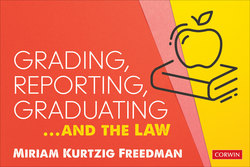Grading, Reporting, Graduating...and the Law

Реклама. ООО «ЛитРес», ИНН: 7719571260.
Оглавление
Miriam Kurtzig Freedman. Grading, Reporting, Graduating...and the Law
Grading, Reporting, Graduating…And the Law
Contents
About the Author
Contact Information
Author’s Acknowledgments
Preface
Introduction: You’re kidding! Another law book for educators and parents! We’ve had enough!
But let’s not get overwhelmed
Grades and report cards: Telling it like it is. Do I have to? Yes, you do!
Grades and report cards—it’s about the WHAT, not the WHO
Another good reason . .
But how do we do this? First the WHAT, then the WHO—not vice versa!
What are the legal requirements for grades and report cards, and setting policy—for all students, general and special education?
Graduation requirements are NOT addressed in federal law. They are addressed in state laws and local policies
First, schools and states are responsible for setting clear standards
But how do we set standards? What are the legal issues?
OK, OK, so what is “due process”?
How much due process?
How and where do we establish policies?
What types of issues should these policies involve?
What steps should schools take to set grading policies? It’s as easy as A, B, and C!
Think of getting coffee at your favorite cafe
If we set standards, will courts or hearing officers uphold them?
Getting more specific about grading policies and promotion/retention. FIRST: What are regular grades? (Start with the WHAT!)
Who has authority to grant regular grades?
Do courts or hearing officers have authority to grant or change grades?
Should students with disabilities be held to the same grading standards as general education students?
SECOND: Modified or adjusted grades—can we have them?
THIRD: What about weighted grades—can we use them?
I’m still confused. What if it’s harder for me to do an easy dive than for Sara to do the harder dive? Isn’t that unfair?
Schools need clear course selection policies to make the continuum work effectively
Promotions and retention policies—what should we look for?
Attendance policies that penalize students for too many absences
Develop a Grading and Promotion/Retention Policy
Descriptions of Images and Figures
Graduation requirements: Graduation, ceremony, diplomas
Waivers
For students with disabilities: Section 504, ESSA, the ADAAA, and the IDEA
Section 504 and the ADAAA bar schools from discriminating against students with disabilities on the basis of their disabilities
Who is an otherwise qualified student?
What is an essential requirement?
What are accommodations and modifications?
It’s confusing. What do these words mean?
At IEP and 504 meetings, in court or at hearings—disputes arise because the above definition describes only half the picture
Validity
What is an accommodation?
What is a modification?
Now, let’s talk about accommodations in plain English
Do accommodations give an unfair advantage?
Now, let’s talk about modifications in plain English
ESSA’s modified curriculum change
Meanwhile, back to the IEP process
In some states, without parental consent, don’t modify grades or courses
More about that notice to parents . .
How can schools write IEPs that inform parents of the use of accommodations or modifications?
Miriam’s Pyramid of Laws helps team members understand what the laws require and what goes beyond the requirements
Here are some cases that apply the Pyramid. The lesson is: Don’t overpromise . . . and underdeliver!
What should we put on report cards for students?
Why is that?
If a report card doesn’t reflect modification use, can “grade inflation” and “denial of a FAPE” allegations be far behind?
Can schools provide too many accommodations or modifications? YES. Alas, many do—a practice that may actually violate the IDEA
What about gifted and talented programs? Can a program’s criteria exclude students with disabilities?
And what about honors?
Descriptions of Images and Figures
Report cards, transcripts, honors, graduation, and diplomas: What’s okay?
On writing transcripts for students with disabilities
Which words can we use on transcripts?
Besides appropriate language, remember the continuum. It is key!
Finally, decisions need to be made on an individualized basis, and sometimes on a course-by-course basis at IEP meetings. Remember the “I” in IEP!
Lessons learned: The district appropriately . .
Graduation. The day finally arrives!
Graduation happens when:
What is prior written notice?
CAVEAT: Transition planning
Graduation ceremony
Can parents sue to have a student participate in the graduation ceremony?
Valedictorian, valedictorian: Who is the valedictorian?
Diplomas
The OCR, hearing officers, and the courts have approved many types of diplomas and certificates
Can parents sue for the right to a diploma?
Are we done yet?
Postscript
Glossary
Additional Resources
References and Cases
Отрывок из книги
The information provided herein is intended to be used for general information only. It is not provided as legal or other professional advice or as a legal service. In the event that legal advice is required, services of an attorney should be sought.
Together—moving from confusion to confidence, to get back to the mission of educating ALL children.
.....
This little flipbook of law includes reference to the 2004 Individuals with Disabilities Education Act (hereinafter, the IDEA), and 2006, 2008, 2016, and 2017 amendments to Part B (of the IDEA) regulations; Section 504 of the Rehabilitation Act of 1973 (Section 504, or simply 504) and its regulations; the 2009 Americans with Disabilities Act Amendment Act (ADAAA) and its 2010 and 2016 further amendments; the 2015 Every Student Succeeds Act (ESSA), which replaced the No Child Left Behind Act (NCLB)—which are reauthorizations of the 1965 Elementary and Secondary Education Act (ESEA); the Supreme Court’s 2017 Endrew F. v. Douglas County School District RE-1 and 1982 Board of Education of Hendrick Hudson Central School District v. Rowley (hereinafter Endrew F. and Rowley)1 decisions, selected due process and other court decisions, and U.S. Department of Education guidance.
1 A word about case and document names in this little flipbook of laws. The full names, citations, and years of court and hearing officer decisions—as well as ED guidance—are spelled out the first time they appear. Thereafter, names may be abbreviated and citations omitted. References and Cases lists complete citations for all.
.....